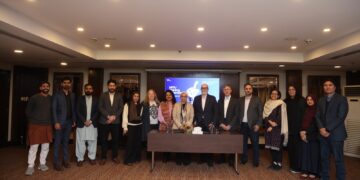Karachi, May 2024: Federal Ombudsman Ejaz Ahmed Qureshi and Chief Secretary Sindh Syed Asif Hyder Shah presided over a meeting regarding prison reforms on Thursday.
Senior Advisor to the Ombudsman Anwar Haider, the Secretary of Health, the Inspector General of Prisons, and officials from the Home Department attended the meeting.
The primary focus of the meeting was to comprehensively assess the current state of prisons across Sindh and devise strategies for their enhancement and reforms.
Chief Secretary Syed Asif Hyder Shah informed the meeting about several key initiatives aimed at enhancing the efficiency and effectiveness of the province’s correctional facilities.
Chief Secretary Sindh said that provincial government plans to introduce audio and video link system in all prisons across Sindh. This will enable prisoners to appear in court proceedings and talk with their families via video links.
Chief Secretary further stated that 500 acres of land will be allocated for the construction of a new prison in Karachi. This development is expected to alleviate overcrowding issues and improve living conditions for inmates.
Furthermore, the budget for provisioning quality food to prisoners has been significantly increased from 1200 million to 2400 million, underscoring the commitment to ensuring the well-being of inmates.
To strengthen oversight and accountability within the prison system, Chief Secretary Shah announced the formation of 22 oversight committees, each dedicated to monitoring the conditions within a specific prison facility.
Highlighting efforts to empower inmates through education and skill-building initiatives, it was announced that educational and vocational training programs are being extended to 2824 prisoners. Additionally, female prisoners in Karachi Central Jail are now being offered digital courses from prominent platforms such as Google and Amazon.
Federal Ombudsman Ejaz Ahmed Qureshi expressed his satisfaction over the significant progress made in prison reforms across Sindh. He commended the efforts undertaken and emphasized the importance of ongoing initiatives in alignment with directives from the Supreme Court.




















